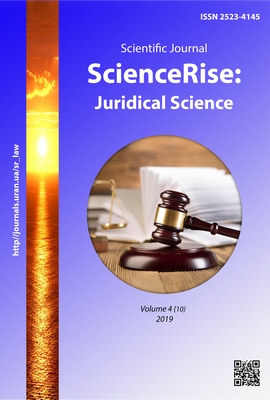Legal principles of intellectual property protection in the digital society
DOI:
https://doi.org/10.15587/2523-4153.2019.188163Keywords:
intellectual property, legal framework, digital society, protection of intellectual property, the latest information technologiesAbstract
The article analyzes the conditions for the protection of intellectual property in the digital society, which is the result of the introduction of global security, and presents a rather innovative problem, not yet well understood in the domestic legal field. It is noted that the Western world has accumulated many problems in the information space, including criminal structures that use huge amounts of intellectual property around the world, from plans to launch new products of certain companies to the primary codes of their computers. We are discovering ways that criminal corporations, terrorist organizations, who use the latest technologies, and do so successfully, are using us, as we are constantly falling behind them with our means of protection and legal protection of intellectual property. Earlier, only digital intellectual property was pirated - music, videos, games and software, but today the digital world is changing. Attention is drawn to the fact that the legal foundations of intellectual property protection in the digital society are a legal perspective on the flip side of technological innovation and the consequences that threaten our interconnected and endlessly vulnerable world. Today, worldwide, there is a problem with technical, information and legal literacy. In a world full of gadgets, algorithms, computers, laptops, REID chips and smartphones, only a small fraction of people have any idea how these objects work. Legal protection of intellectual property is necessary both for the state, for the private sector of business, and for education. The article notes that we need to increase the technical, information and legal literacy of the population, whose goal is to provide citizens with a basic understanding of how technology works, to prevent others from taking advantage of this technological and legal ignorance, and to harm people so that everyone a person has learned to write computer codes and resist technical (technological) crimesReferences
- Andriukaitene, R., Voronkova, V., Kyvliuk, O., Romanenko, T., Ryzhova, I. (2017). Kontseptualyzatsyia smart-obshchestva y smart-tekhnolohyi v kontekste razvytyia sovremennoi tsyvylyzatsyy. Mokslas ir praktika: aktualijos ir perspektyvos, 11–12.
- Appelo, Yu. (2019). Agile-menedzhmyent. Liderstvo ta upravlinnia komandamy. Kharkiv: Vyd-vo «Ranok»: Fabula, 432.
- Brinolfsson, E., Makafi, E. (2016). Druha epokha mashyn: robota, prohres ta protsvitannia v chasy nadzvychainykh tekhnolohii. Kyiv: FUND, 236.
- Hudmen, M. (2019). Zlochyny maibutnoho. Kharkiv: Vyd-vo «Ranok»: Fabula, 592.
- Kapitanenko, N. P. (2017). Publichne upravlinnia ta administruvannia v umovakh informatsiinoho suspilstva: vitchyznianyi i zarubizhnyi dosvid. Zaporizhzhia: RVV ZDIA, 603.
- Obushchak, O. O., Obushchak, S. A. (2009). Administratyvne rehuliuvannia u sferi okhorony prav na obiekty intelektualnoi vlasnosti. Humanitarnyi visnyk Zaporizkoi derzhavnoi inzhenernoi akademii, 36, 75–85.
- ORaili, T. (2018). Khto znaie, yakym bude maibutnie. Kyiv: Nash format, 448.
- Rouz, D. (2018). Dyvovyzhni tekhnolohii. Dyzain ta Internet rechei. Kharkiv: Knyzhkovyi klub «Klub simeinoho dozvillia», 336.
- Ross, A. (2017). Industrii maibutnoho. Kyiv: Nash format. 320.
- Stainer, K. (2018). Totalna avtomatyzatsiia. Yak kompiuterni alhorytmy zminiuiut zhyttia. Kyiv: Nash format, 280.
- Ford, M. (2016). Pryshestia robotiv. Tekhnika i zahroza maibutnoho. Kyiv: Nash format, 400.
- Floryda, R. (2018). Homo creatives. Yak novyi klas zavoiovuie svit. Kyiv: Nash format, 432.
- Kelli, K. (2018). Nevidvortne. 12 tekhnolohii, shcho formuiut nashe maibutnie. Kyiv: Nash format, 304.
- Maksymeniuk, M. Yu., Nikitenko, V. O. (2016). Informatsiino-komunikatyvne suspilstvo yak riznovyd skladnoi sotsialnoi systemy i vzaiemodii. Humanitarnyi visnyk Zaporizkoi derzhavnoi inzhenernoi akademii, 66, 266–278.
- Pozhuiev, V. I. (2010). Osmyslennia mistsia i roli informatsii u suchasnomu suspilstvi. Humanitarnyi visnyk Zaporizkoi derzhavnoi inzhenernoi akademii, 42, 4–13.
- Punchenko, O. P., Shylyna, N. E. (2016). Dynamyka noosferyzatsyy obrazovanyia ynformatsyonnoi tsyvylyzatsyy. Humanitarnyi visnyk Zaporizkoi derzhavnoi inzhenernoi akademii, 67, 28–39.
- Punchenko, O. P. (2010). Obrazovanie v sisteme filosofskikh cennostei: monografiia. Odessa: Astroprint, 506.
- Ryzhova, I. S. (2017). Smart–tekhnolohii yak faktor rozvytku suchasnoho dyzainu. Humanitarnyi visnyk Zaporizkoi derzhavnoi inzhenernoi akademii, 69 (1), 174–183.
- Ryzhova, I. S. (2011). Kultura yak naibilsh fundamentalnyi sposib liudskoho buttia. Humanitarnyi visnyk Zaporizkoi derzhavnoi inzhenernoi akademii, 46, 126–134.
- Sosnin, O. V., Voronkova, V. H., Azhazha, M. A. (2016). Filosofiia humanistychnoho menedzhmentu (sotsialno-politychni, sotsialno-ekonomichni, sotsialno-antropolohichni vymiry). Zaporizhzhia: Dyke pole, 356.
- Cherep, A., Voronkova, V., Nikitenko, V., Azhazha, M., Muts, L. (2019). Tsyfrova kultura (fintekh) yak chynnyk pidvyshchennia efektyvnosti ekonomiky ta biznesu v umovakh tekhnolohichnoi revoliutsii 4.0. Eastern european conference of management and economics. Liubliana, 93–97.
- Shevchenko, A. (2018). Didzhital era. Prosto o cifrovykh tekhnologiiakh. Kyiv: Sammit-Kniga, 457.
- Melnyk, V. V. (2011). Sotsialno-filosofskyi analiz vzaiemovplyvu i vzaiemodii osobystosti i hlobalizovanoho sotsiumu. Humanitarnyi visnyk Zaporizkoi derzhavnoi inzhenernoi akademii, 46, 96–108.
- Oleksenko, R. I. (2015). Filosofiia rozvytku informatsiinoho suspilstva v epokhu hlobalizatsii. Hileia, 38, 229–232.
- Shvab, K. (2019). Chetverta promyslova revoliutsiia. Formuiuchy chetvertu promyslovu revoliutsiiu. Kharkiv: Klub simeinoho dozvillia, 426.
Downloads
Published
How to Cite
Issue
Section
License
Copyright (c) 2019 Valentyna Voronkova, Nataliia Kapitanenko, Vìtalina Nikitenko

This work is licensed under a Creative Commons Attribution 4.0 International License.
Our journal abides by the Creative Commons CC BY copyright rights and permissions for open access journals.
Authors, who are published in this journal, agree to the following conditions:
1. The authors reserve the right to authorship of the work and pass the first publication right of this work to the journal under the terms of a Creative Commons CC BY, which allows others to freely distribute the published research with the obligatory reference to the authors of the original work and the first publication of the work in this journal.
2. The authors have the right to conclude separate supplement agreements that relate to non-exclusive work distribution in the form in which it has been published by the journal (for example, to upload the work to the online storage of the journal or publish it as part of a monograph), provided that the reference to the first publication of the work in this journal is included.









